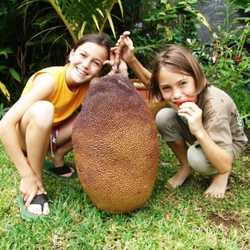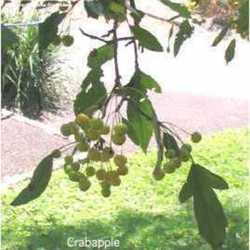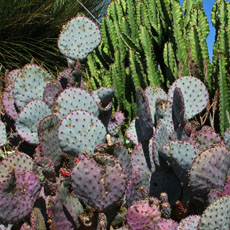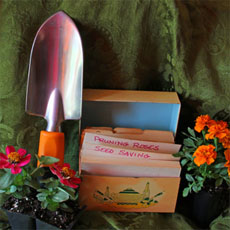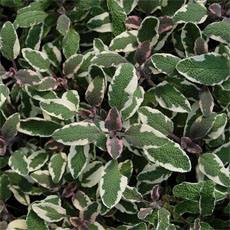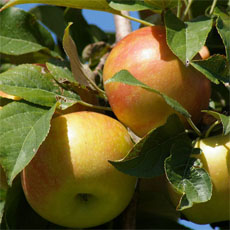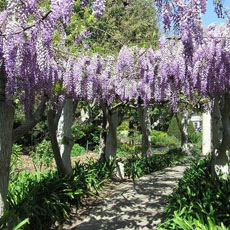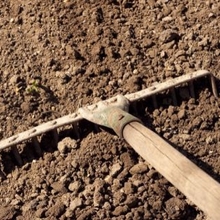We'd been trying to eat more fruit at my house, as part of a more healthy life-style, but the fruit kept going bad! The nectarines weren't ripe, until they were all ripe at once (and how many cut-up nectarines can fit in one cereal bowl, really?). The pineapple, a family favorite, just sat there until someone dared to cut it up, by which time was often too late. The canteloupe (a healthy choice) got bad on one side if it from sitting too long on that side.
Well, naturally, one thought led to another, and next thing you know, I'm researching how it is they can pick all those apples in Washington State at once, and be able to send them anywhere, fresh and crisp, at any time of year. Or why it is that some fresh produce items should be refrigerated when you bring them home, and others should not. I guess I was looking for a Unified Field Theory of Fruit Storage!
Those Little Plastic Bags
Now, I try to avoid putting my produce into those mold- and slime-inducing plastic bags that all grocery stores seem to dispense ubiquitously these days. The cashier will add the baggie if I manage to sneak a lemon or a bunch of bananas in without one. When you get home, you MUST REMOVE YOUR STUFF FROM THE BAGGIES! You may transfer it to a brown paper bag, a fruit bowl, a special ventilated bag, anything, but take it out of the stupid baggie. I sometimes try to save mine to reuse but often the cashiers tie sailor's knots in them that I can't undo.
Fruits vs. Vegetables
There is a lot of discussion about this online. Is a tomato a fruit? Egad, if it is, then we have to include cucumbers, squash, and so on. People talk about a botanical definition versus a culinary definition.
Fruits
Obvious fruits include drupes, or stone fruits, like cherry, plum, peach, nectarine; pomes, which are apples, pears and other more exotic fruits like loquat, medlar and quince. These all continue to ripen after they've been picked, as I'm sure you've experienced. What you may not know is that they will keep a very long time under ideal conditions.
I once heard a radio interview with a nectarine grower who advised leaving the fruit outside the refrigerator until it's exactly as ripe as you like, then popping it in the fridge and eating it at your leisure. This way you can buy a week's worth of nectarines at once and eat them one at a time without having any go bad. I store them in the fridge on top of a paper towel.
Apples and pears, a determinate crop peculiar (now) to Washington State, all ripen at once. The distributors have huge warehouses of storage rooms full of stacks of fruit. Stored at just above freezing and with various levels of other gases controlled, these fruits can be kept year-round on the brink of ripe-ness, so that when the gift basket reaches the recipient, the fruit will still be perfect, 11 months after it was picked!
I don't suggest you keep your apples and pears for 11 months—merely that you keep them in the coldest non-freezing part of your refrigerator and/or wrapped separately in your cold, unheated garage.

One Bad Apple Does Spoil the Whole Bunch
The old adage about one bad apple spoiling the whole bunch refers to ethylene gas, a powerful ripening agent released in large quantities by ripening (or maximally ripened=bad) apples and other fruit. Ethylene gas works so well that it is used commercially to force tomatoes and other fruity-vegetables into ripening prematurely. It is why you may hear that if you have a green or under-ripe tomato, you should leave it in a brown paper bag with an apple, a banana or another piece of ripe fruit. And you definitely shouldn't store ripening things such as fruits, which are ethylene gas producers, anywhere near what I'm calling vegetables, produce (like sweet corn) where you do not wish further ripening to occur, or produce that is susceptible to ethylene gas effects. (Flowers are also susceptible to the ripening or aging effects of ethylene. This is why you should probably not buy flowers from a grocery store, unless they are stored far away from the ripening fruit! Use a florist, or better yet, your own garden.)
Pomes and Citrus are Like Apples and Oranges
Citrus don't convert starch into sugar after they ripen—they're as sweet as they're ever going to get the day they are picked, and after that they just get old and dry. They do have a much longer storage life than sweet corn, but citrus will enjoy the moisture of your crisper drawer more than the cold dryness of your root cellar or unheated garage (I speak from sad experience here).
Berries
Yes, you may leave cherries (which are drupes) or blueberries (which aren't "true" berries either) out on the counter for munching, if you think they'll be all gone in a day. Blueberries are ripe when picked and don't get riper, just older; cherries, like all drupes, continue to ripen or soften. Of course, they will last much longer in the cold humidity of your refrigerator. Strawberries (at last, true berries) and "bramble" berries, like raspberries (which are made up of tiny little drupe-lets), are much more fragile and should be refrigerated right away. As with most all the fruits we're discussing, the riper they get, the softer they get, and the easier the.y are to damage.
Grapes are real berries too, and this link gives lots of information about how to select and store them. If you're lucky enough to have your own grape vine, inspect each bunch carefully for mold. If the bunch looks good, or if you discard any soft or moldy grapes, store the bunch in the refrigerator without washing! Store them in the ventilated bag they came in, or in your own zip-top plastic bag. Wash them right before eating or freezing! I've never done it. but apparently frozen grapes are a real treat.
Bananas are actually, also from a botanical point of view, berries! If you do the same nectarine trick, allow them to ripen outside the refrigerator until perfect and then stick them inside, two things will happen. Firstly, the banana peel will turn an unappetizing brown, however, second is that the banana flesh will remain flawless and perfect until you're either ready to eat it or make something like Bananas Flambé where your guests will only see the flaming sweetened bananas and not the browned peels. If you forget and leave them outside of the fridge for too long so that they are too ripe to eat (and are spewing masses of ethylene gas), peel them into a baggie, seal it up and toss it in the freezer until you're ready to make banana bread or banana cream pie or whatever dish of your choice that uses over-ripe bananas. And don't forget to compost those banana peels!

Pineapple and other weird stuff
Pineapples do NOT get riper after they are picked, so it's best to refrigerate them, too, and I would if I had an extra fridge! You can tell if a pineapple is ripe by smelling the bottom. Actually the "sniff test" works on many, many items of produce. (Works on babies, too!) Smell the end of that melon. Smell the bottom of the box of strawberries. Smell the tomatoes and the zucchini. Fresh, ripe produce exudes a smell of.....fresh ripe produce. Over-ripe produce smells fetid, or too-sweet, or of garbage. Don't buy anything that doesn't smell appetizing and if your garden doesn't smell good, clean it up!
I love coconuts, but I have heard so many different explanations of what a "ripe" coconut is (from my Caribbean friends) that I will not attempt to recapitulate them here. Suffice it to say that when we buy a coconut in a northern grocery store, it is already dried-up and tasteless to anyone who grew up with coconut palms out their window.
I don't know anything about storing mangos, papayas, or anything else exotic, and neither did any of my written sources. I have it on expert personal authority (my Caribbean friends, again) that these fruits are often mis-labeled in our northern super-markets by workers who have never had the chance to see them grow in the tropicss. For instance, the "Caribbean pear" my husband bought, liking both the Caribbean and pears, turned out to be a green mango. Luckily he likes the occasional mango, too. But I encourage you to take your own Internet voyage to discover how best to care for your favorite fruits.
Melons
Melons are part of the squash family, or squash are part of the melon family, or both are part of the Cucurbitaceae family. Whatever, they probably should be treated similarly. Here are a few nuggets peculiar to melons, though.
According to the Virginia Cooperative Extension of Virginia Tech, muskmelons, also known as canteloupe, should be harvested when they slip off the vine easily for maximum sugar content, but will sweeten (ripen) further if allowed to stand a day or two longer at room temperature. Honeydew and watermelon do not "slip" but they do show tell-tale signs of ripeness. A ripe melon can be stored 15 days at 35-41°, they say, with 95% humidity. Failing those perfect conditions, I'd say a day or two on the counter, longer in the fridge (but we never have space). Our compromise has been to cut up the melon when it has reached the moment when it can no longer occupy the counter-top. (We do this with very ripe pineapples as well.) They take up much less space cubed in a plastic container than in the beautiful shape Nature gave them. The only melon this doesn't work with is watermelon. Watermelon is just not firm enough, in my mind, to hold its own in a fruit salad.
Vegetables that are really fruits
We will cover vegetables that are really fruits and other vegetabes I can think of in an article to follow.
The BEST thing to do with ripe fruit
Clearly, the best things to do with your perfectly ripe fruit are to freeze it, can it, preserve it, make pie, jelly or wine or EAT IT!
As for my opening question, it is possible to have some kinds of produce available year-round if you have climate-controlled storage rooms, with separate temperatures and mixtures of gases for each cultivar of apple or melon, and so forth, and you don't mind wrapping each piece of fruit individually. I like the EAT IT solution best!
Thanks to Dave's Garden Subscribers FarmerDill for the scrumptious peaches, unfortunately only digital, and Todd_Boland, whose lingonberries made me ready for some roast turkey (odd for a day which will be over 100° for sure)! The heap of watermelons comes from Morguefiles.com. I find it remarkable that anybody can take such good photographs - thanks to all!


